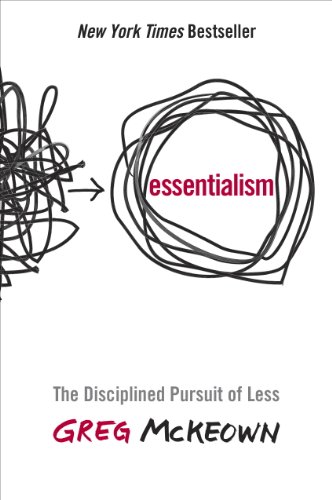McKeown, Greg. Essentialism: The Disciplined Pursuit of Less, 2014. Print.
Greg McKeown’s Essentialism has a thesis similar to Richard Koch’s The 80/20 Principle: pursue less and achieve more. This is an attractive offer. It’s a version of Walmart’s USP: “Save money. Live Better.” I.e. spend less and get more. Unfortunately, McKeown too often confuses minimalism and essentialism. The book can’t deliver what McKeown promises because he ultimately doesn’t know what’s essential.
Early in the book, McKeown gives a stomach-curdling personal example of getting his priorities wrong. His wife had just given birth to their child, but instead of staying with his wife in the hospital, McKeown capitulated to his boss’s demand that he meet with a potential client. The client was not sold on McKeown’s group because of the visit. To read McKeown’s version of it, McKeown may have hurt his company’s chances by showing up and displaying a total lack of discernment. Again and again, McKeown insists that family and personal relationships are essential and that professional success only precipitates The Disease of More that infects and debilitates its victims.
But what is the basis for determining what is the greatest priority? Should one be systematic in implementing the essentialist philosophy to family and friends too? The book contains nothing on how to say no to a spouse who wants to go on what seems to be an ill-conceived vacation or how many family reunions in a year is too many. McKeown’s essentialism extends to professional work. That’s it. The assumption (one that Richard Koch shares, by the way) is that work is less important than family. The proof? The old Stephen Covey line that no one on their deathbed regrets spending less time at the office. But if McKeown is recommending essentialism as a philosophy–as an overall approach to life–it would help if we knew what mattered most and why. McKeown leaves it up to you. That won’t work. Like the addict, non-essentialists’ own best thinking got them here. How are they to figure out what matters?
Here are McKeown’s essentialist rules: explore, eliminate, and execute. Instead of hurrying up and getting to work, the essentialist makes sure the task is worth doing in the first place by escaping to ruminate, journaling to clarify, sleeping to recharge, and selecting the one thing that can make the most impact. Instead of adding more and more to-dos, the essentialist eliminates unnecessary work by having a clear life purpose, learning how to say no, uncommiting from cul-de-sac projects, and editing existing projects down to the bare essentials. Finally, instead of moving a millimeter in twenty directions, the essentialist moves a mile in one direction by building in a time buffer, subtracting unnecessary steps, making small and steady progress each day, and entering a flow state via a set routine to focus on the present.
Some of McKeown’s advice works. The underlying principle is a good one. McKeown’s advice is motivated by the division of labor. Do what you’re best at so you can reap asymmetrical rewards. My caveat? Make sure you’re playing with the correct timetable. Eternity is a long time. McKeown seems to think this world is the only one where “essentials” get measured. Christians should think about the “one thing” that matters most. Jesus praises Mary for doing the “one thing that is necessary.” He tells the rich young ruler he lacks “one thing.” In the Sermon on the Mount, he says that we should seek first the kingdom of God. This is essentialist thinking rightly applied.
But a lot of this book doesn’t work. Yes, there are small mistakes that rankled me. Vilfredo Pareto wrote his influential work on the 80/20 principle in the 1890s, not the 1790s as McKeown claims. Derek Sivers is more just a Ted Talk all-star, which is how McKeown describes him. Sivers created and ran CD Baby, the internet’s largest independent music distributor. Finally, if you’re recommending works of “classic literature” and recommend books like the Bible or the Koran or the Upanishads, don’t then include James Allen’s As a Man Thinketh in the same breath. You might as well compare my evening jogs to Olympic-level marathons.
But more importantly, McKeown doesn’t tell us why less is better. What’s the point of success in the first place? The very thing Greg McKeown fears–the success that adds unnecessary responsibility and distractions–seems to be the point in Jesus’s parable of the talents. The servant who begins with five talents adds another five to that. He then receives the talent the unfaithful servant hid. Anyone considering the essentialist philosophy should reckon with Matthew 25:29: “For to everyone who has will more be given, and he will have an abundance. But from the one who has not, even what he has will be taken away.” Why is this faithful servant getting more responsibility? Shouldn’t he get fewer talents and then make those fewer talents go further?
A rewritten formula then: explore ways to serve God and His kingdom (Matthew 6:33), eliminate every weight that would prevent you from that exploration (Hebrews 12:1), then execute with the faith that God will give you the strength necessary to complete the tasks He’s given you (Philippians 2:13). To what end? That God’s kingdom would be on earth as it is in heaven. That’s not minimalist. When it comes in its fullness, God’s kingdom will fill the earth.

